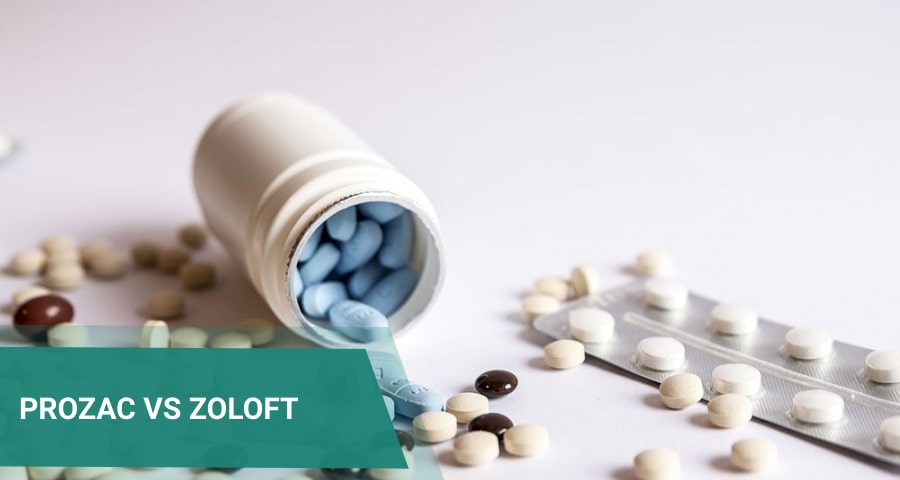
Zoloft and Prozac are the brand names for two different drugs used in the treatment of depression. They belong to the same class of drugs in the way that they act in the CNS. However, they have some differences in the conditions they treat, side effects, and more. This article will put Zoloft vs Prozac to discuss those differences.
Table Of Contents:
What Are Zoloft and Prozac?
Zoloft and Prozac are both antidepressant medications. Zoloft is a brand name for sertraline, while Prozac is the brand name for fluoxetine. It is possible to find fluoxetine or sertraline under other brand names.
While these can be classified as antidepressants, there are many drug classes under that. Of those, both Zoloft and Prozac can be classified as selective serotonin reuptake inhibitors, or SSRIs, based on their mode of action in the CNS.

Comparing these medications it should be noted that both stay in the system for an extended period compared to other drugs. However, Prozac has a longer half-life (2 to 7 days), and sertraline half-life is 26 hours.
Indications for Use
Zoloft and Prozac are both used in treating depression, and their status as antidepressants makes this their best-known use. They find use in the treatment of panic disorder as well. However, when examining Zoloft vs Prozac, many other indications may necessitate using these drugs.
The Table Below Shows the FDA-Approved Indications for Prozac vs Zoloft:
| Disease | Zoloft | Prozac |
|---|---|---|
| Major Depressive Disorder | ✔ | ✔ |
| Obsessive Compulsive Disorder (OCD) | ✔ | ✔ |
| Bulimia Nervosa | ✘ | ✔ |
| Panic Disorder | ✔ | ✔ |
| Post-Traumatic Stress Disorder (PTSD) | ✔ | ✘ |
| Social Anxiety Disorder | ✔ | ✘ |
| Premenstrual Dysphoric Disorder | ✔ | ✘ |
While the above are the FDA-approved uses for these drugs, there are many different ways that fluoxetine vs sertraline are prescribed off-label in treating some health conditions and their symptoms.
For Fluoxetine, Conditions It Is Used To Treat off-Label Include:
- Premature ejaculation
- Prevention of migraines
- Fibromyalgia
- Binge eating disorder
- Impulsive aggression
Off-Label Sertraline Is Used In the Treatment Of:
- Premature ejaculation
- Generalized anxiety disorder
- Body dysmorphic disorder
- Binge eating disorder
- Bulimia nervosa
Side Effects
As both these drugs are SSRIs, there are some adverse reactions that they share. However, they are also distinct enough that some adverse effects are specific to either of these medications.
Whether One Is Using Prozac or Zoloft, Here Are Some Side Effects That May Be Experienced:
- Insomnia
- Headache
- Nausea
- Diarrhea
- Dry mouth
- Dizziness
- Delayed ejaculation (which explains their use as a treatment for premature ejaculation)
- Loss of appetite (anorexia)
- Anxiety
- Sweating
- Impotence
- Constipation
- Vomiting
On their own, each of these medications has adverse reactions which are not present when using the other.
Starting With Sertraline, Some of the Side Effects Unique to It Are:
- Fatigue
- Drowsiness
- Agitation
- Paraesthesia
- Malaise
- Pain
The Following Are the Side Effects of Prozac:
- Weakness (asthenia)
- Excessive sleeping (somnolence)
- Tremors
- Abdominal pain (dyspepsia)
- Chills
- Palpitations
- Rash
- Unusual dreams
- Decreased libido
Drug Interactions
The chemistry of any medication is a complex thing. They work to achieve a particular effect in the body. Still, the complexity of their action means that they may affect the enzymes that metabolize other medications or alter the levels of chemical substances that other drugs depend on. It is essential to be aware of possible drug interactions if you are on any chronic medication.

Fluoxetine and Zoloft, as SSRIs, are not exempt from this, and they both share interactions with certain medications. Always make sure your doctor or pharmacist knows all the medicines that you currently take. If you use any of the following medications, ensure you have informed your doctor and gotten his approval before continuing.
- Anticlotting agents, such as clopidogrel, aspirin, and warfarin
- Non-steroidal anti-inflammatory medications, such as ibuprofen and diclofenac
- Monoamine oxidase inhibitors, another class of antidepressants. These include isocarboxazid, phenelzine, procarbazine, and tranylcypromine.
- Drugs that increase serotonin levels, including illicit substances such as MDMA, serotonin, and norepinephrine reuptake inhibitors (SNRIs) such as venlafaxine and duloxetine, St. John’s wort, and tryptophan.
- Other SSRIs such as paroxetine.
- Drugs that induce drowsiness, such as benzodiazepines (diazepam, alprazolam), antihistamines like diphenhydramine, opioid drugs, and cannabis.
- Pimozide, an antipsychotic drug
Cytochrome P450 is a family of enzymes that are integral for the metabolism of many drugs people take. If this enzyme is inhibited, it can extend the action of medications dependent on it for breakdown. SSRIs are generally Cytochrome P450 inhibitors, though to different extents. When comparing Zoloft vs Prozac, they inhibit this enzyme differently. While Zoloft is merely a moderate inhibitor, fluoxetine is a potent one. Fluoxetine’s inhibitory effects can last for weeks, even after the last dose, so it is essential to let your doctor know if you are taking or have taken fluoxetine recently.
The Following Medications Can Be Affected By Fluoxetine Specifically:
- Vinblastine
- Thioridazine
- Antiarrhythmics, like propafenone and flecainide
- Tricyclic antidepressants, like desipramine and imipramine
- Antipsychotics, such as haloperidol and clozapine
- Anticonvulsants like carbamazepine
- While pimozide can be mixed with sertraline if the dosage is reduced, it should never be combined with fluoxetine
Besides that, drinking alcohol on Fluoxetine or Zoloft is not recommended. It can increase the likelihood of adverse reactions of both substances and overdose. When putting sertraline vs Prozac, it can be seen clearly that the interactions are more extensive with fluoxetine.
Using Prozac and Zoloft in Children
Both of these medications have been established to be safe for treating certain conditions in children.
Sertraline has been found to be safe and effective in treating obsessive-compulsive disorder in children between the ages of 6 and 17. However, it has not been deemed safe for any other indication in children.

Meanwhile, fluoxetine is similarly found to be safe and effective in children, though in those who are at least 7 years of age. It can also be utilized to treat the major depressive disorder in children, starting from 8 years of age.
In combination with olanzapine, fluoxetine is also safe for treating bipolar disorder in children over 10 years of age.
Prozac vs Zoloft Weight Gain
SSRIs generally are known to cause changes in weight, though to different extents depending on the drug. With Zoloft vs Prozac, the weight changes are also distinct. A study in 2000 showed that patients who used fluoxetine had a modest decrease in weight, while those who used the latter had a modest increase in weight. However, both of these changes were judged to be non-significant. Non-significant changes were changes of less than 7% from the base weight.
Another study done over 2 years showed significant weight gain in those who used sertraline and other SSRIs but non-significant for fluoxetine alone.
Regarding weight effects with Prozac vs Zoloft, it shows that fluoxetine either causes a decrease in weight or non-significant weight gain, while sertraline causes weight gain.
Safety of Combining Prozac and Zoloft
Both of these medications belong to the same class, both being SSRIs. They act with the same mechanism of action and should not be combined.
This is because using these two medications together will only increase the likelihood of adverse effects. In particular, it can cause what is known as serotonin syndrome, which can be potentially fatal.
Switching from Prozac to Zoloft
For patients on fluoxetine, switching from Prozac to Zoloft may be beneficial. The medications are pretty similar, however, when putting Prozac vs Zoloft in terms of side effects, the safety profile of sertraline is generally preferable. It has fewer adverse effects, and though it tends to cause weight gain, it has one of the lowest incidences of that side effect among SSRIs.
If you are intent on switching medication, be sure to let your medical doctor know. It would be best if you used either Prozac or Zoloft and not both. Both of them are effective in their own ways.
Find Drug Rehabilitation Centers Near You Anywhere In the US
Addiction Resource team has compiled an extensive list of the top drug rehabilitation facilities around the country. Use our locator tool to find the best centers near you.
Page Sources
- U.S. Food and Drug Administration, Zoloft Prescribing Information, 2016, https://www.accessdata.fda.gov/drugsatfda_docs/label/2016/019839S74S86S87_20990S35S44S45lbl.pdf
- U.S. Food and Drug Administration, Prozac Prescribing Information, 1987, https://www.accessdata.fda.gov/drugsatfda_docs/label/2011/018936s091lbl.pdf
- Adly, C., Straumanis, J., & Chesson, A. (1992). Fluoxetine prophylaxis of migraine. Headache, 32(2), 101–104, https://pubmed.ncbi.nlm.nih.gov/1551787/
- Singh HK, Saadabadi A. (2020) Sertraline. [Treasure Island (FL): StatPearls Publishing; https://www.ncbi.nlm.nih.gov/books/NBK547689/
- Hemeryck, A., & Belpaire, F. M. (2002). Selective serotonin reuptake inhibitors and cytochrome P-450 mediated drug-drug interactions: an update. Current drug metabolism, 3(1), 13–37. https://pubmed.ncbi.nlm.nih.gov/11876575/
- Fava, M., Judge, R., Hoog, S. L., Nilsson, M. E., & Koke, S. C. (2000). Fluoxetine versus sertraline and paroxetine in major depressive disorder: changes in weight with long-term treatment. The Journal of clinical psychiatry, 61(11), 863–867. https://pubmed.ncbi.nlm.nih.gov/11105740/
- Maina, G., Albert, U., Salvi, V., & Bogetto, F. (2004). Weight gain during long-term treatment of obsessive-compulsive disorder: a prospective comparison between serotonin reuptake inhibitors. The Journal of clinical psychiatry, 65(10), 1365–1371. https://www.researchgate.net/publication/8226268_Weight_gain_during_long-term_treatment_of_obsessive-compulsive_disorder_A_prospective_comparison_between_serotonin_reuptake_inhibitors
- Volpi-Abadie, J., Kaye, A. M., & Kaye, A. D. (2013). Serotonin syndrome. The Ochsner journal, 13(4), 533–540. https://www.ncbi.nlm.nih.gov/pmc/articles/PMC3865832/


 Reviewed by:
Reviewed by:  Written by:
Written by: 

 FindTreatment.gov
FindTreatment.gov